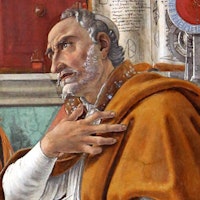Anyone who is rational enough to prefer right to wrong and order to disorder can see that the kind of peace that is based on injustice… does not deserve the name of peace.
Saint Augustine

Does Not Deserve the Name of Peace
Topic: Overcoming Adversity
“Sinful man hates the equality of all men under God and, as though he were God, loves to impose his sovereignty on his fellow men. He hates the peace of God which is just and prefers his own peace which is unjust…. Anyone who is rational enough to prefer right to wrong and order to disorder can see that the kind of peace that is based on injustice, as compared with that which is based on justice, does not deserve the name of peace.“
Augustine of Hippo (13 November 354 – 28 August 430), also known as Saint Augustine, was a theologian and philosopher of Berber origin and the bishop of Hippo Regius in Numidia, Roman North Africa. His writings influenced the development of Western philosophy and Western Christianity, and he is viewed as one of the most important Church Fathers of the Latin Church in the Patristic Period. His many important works include The City of God, On Christian Doctrine, and Confessions.
Early life and conversion
Augustine was born in Tagaste, Numidia (modern Souk Ahras, Algeria), to a pagan father and a Christian mother. He was educated in Tagaste and Carthage, where he studied rhetoric. In his youth, he was drawn to the eclectic Manichaean faith, and later to the Hellenistic philosophy of Neoplatonism. After his conversion to Christianity and baptism in 386, Augustine developed his own approach to philosophy and theology, accommodating a variety of methods and perspectives.
Later life and legacy
Augustine was ordained a priest in 391 and was made bishop of Hippo in 396. He served as bishop for the rest of his life, during which time he wrote prolifically on a wide range of topics, including theology, philosophy, and politics. His writings had a profound impact on the development of Western Christianity, and he is considered one of the most important figures in the history of the Church.
Augustine's thought was shaped by his own personal experiences, as well as by the intellectual and religious currents of his time. He was deeply influenced by the writings of the apostle Paul, and he also drew on the insights of the Platonic tradition. Augustine's theology is characterized by its emphasis on the grace of God, the freedom of the will, and the importance of the Church. His writings have been interpreted in a variety of ways, and they continue to be studied and debated by scholars today.
Augustine is recognized as a saint in the Catholic Church, the Eastern Orthodox Church, the Lutheran Churches and the Anglican Communion. He is also a preeminent Catholic Doctor of the Church and the patron of the Augustinians. His memorial is celebrated on 28 August, the day of his death. Augustine is the patron saint of brewers, printers, theologians, and a number of cities and dioceses. His thoughts profoundly influenced the medieval worldview. Many Protestants, especially Calvinists and Lutherans, consider him one of the theological fathers of the Protestant Reformation due to his teachings on salvation and divine grace. Protestant Reformers generally, and Martin Luther in particular, held Augustine in preeminence among early Church Fathers. From 1505 to 1521, Luther was a member of the Order of the Augustinian Eremites.
In the East, his teachings are more disputed and were notably attacked by John Romanides, but other theologians and figures of the Eastern Orthodox Church have shown significant approbation of his writings, chiefly Georges Florovsky. The most controversial doctrine associated with him, the filioque, was rejected by the Eastern Orthodox Church. Other disputed teachings include his views on original sin, the doctrine of grace, and predestination. Though considered to be mistaken on some points, he is still considered a saint and has influenced some Eastern Church Fathers, most notably Gregory Palamas. In the Greek and Russian Orthodox Churches, his feast day is celebrated on 15 June.
The historian Diarmaid MacCulloch has written: "Augustine's impact on Western Christian thought can hardly be overstated; only his beloved example, Paul of Tarsus, has been more influential, and Westerners have generally seen Paul through Augustine's eyes."
City of God
St. Augustine, City of God (Image Classics Paperback, New York – Abridged, January 19, 1958) p. 454.

Saint Augustine
Resources
Copyright © 2017 – 2025 LuminaryQuotes.com About Us

St. Augustine, City of God
The Desire to Impose One’s Own Peace
In his City of God, St. Augustine noted that “even when men are plotting to disturb the peace, it is merely to fashion a new peace near to the heart’s desire; it is not because they dislike peace as such.”[2] This statement could equally refer to the plots of modern terrorists or to revolutionary movements to throw off oppressive governments—even to the American revolutionaries in the 1770s.
“Sinful man hates the equality of all men under God and, as though he were God, loves to impose his sovereignty on his fellow men. He hates the peace of God which is just and prefers his own peace which is unjust…. Anyone who is rational enough to prefer right to wrong and order to disorder can see that the kind of peace that is based on injustice, as compared with that which is based on justice, does not deserve the name of peace.”
–Augustine, (The City of God, New York: Image Books, 1958) p. 452-454.
Today we see people everywhere attempting to impose an unjust peace on other people. In the world order, larger and more powerful states attempt to impose their views of world peace on smaller and less powerful nations. Within states, economic, ethnic, or other social groups attempt to impose their view of peace on the other groups through control of the machinery of government. In extreme cases of injustice, like Rwanda, genocide can be the result. However, we must view the contentious cultural wars between liberals and conservatives in the United States in a like manner. Neither the liberals nor the conservatives display the big-hearted concern for the entire nation grounded in the principle that “all men were created equal,” as proclaimed at the founding of the United States.
–Gordon L. Anderson [Headwing Philosophy and the Law of Nations (Journal of Unification Studies, Vol. 6, 2004-2005)] pp. 85-96.